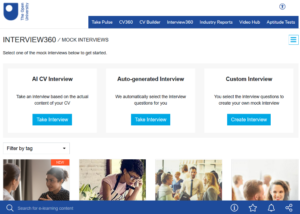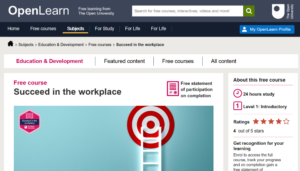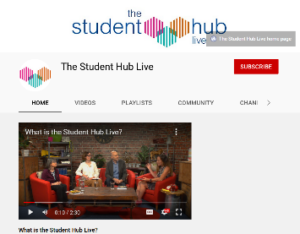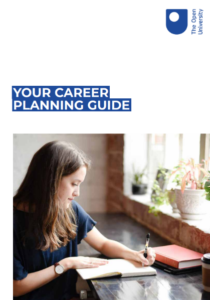
HJ is an OU graduate who studied Politics, Philosophy and Economics. He can usually be found manning the Hot Desk at Student Hub Live events. He’s a lover of stationery, study tips and talking about cake!
Since completing my OU degree I’ve benefitted from the skills and knowledge it’s given me, especially when it comes to my career. However, after 5 years in employment since graduating, I still don’t know what I want to do. And you know what? That’s okay! You can research as much as you want but until you do a job you never know if it is right for you.
I know I love working in public service, but that’s a broad area! The good thing is there are plenty of opportunities and different roles, just finding the right one for me is what’s taking time and it does for some people.
Nearly every 12 months I’ve changed the type of work I’ve done, whether it’s an internal move or moving to another organisation. You would think by now I’d be good at interviews, but most of the time I’m sure it’s just sheer luck!
 I hate interviews, it’s beyond the normal nerves and always stresses me out! I don’t ever think interviewing will be something I’m confident with as I’m the type of person that’s better at showing what I can do rather than talking about it.
I hate interviews, it’s beyond the normal nerves and always stresses me out! I don’t ever think interviewing will be something I’m confident with as I’m the type of person that’s better at showing what I can do rather than talking about it.
Whatever I feel about interviews though, I can see how I’ve improved with practice and I’ve picked up advice and resources that have helped along the way. Although some of these things may seem basic, I find it good to remind myself of these things when preparing for an interview and I’m always a big fan of sharing what we’ve learned!
Make sure you thoroughly review the advert (or any information sent by email). It’s a great way to work out the type of questions you may be asked. If the role is customer-facing, you’ll probably be asked questions around dealing with challenging situations, prioritising work and times you’ve delivered good customer service.
 Thinking about questions relevant to the role is a great way to prepare. There are also questions that are normally asked at every interview. For these common questions, here is a great resource from the OU Help Centre that I like to use to prepare.
Thinking about questions relevant to the role is a great way to prepare. There are also questions that are normally asked at every interview. For these common questions, here is a great resource from the OU Help Centre that I like to use to prepare.
Setting up beforehand. Interviews have changed and rather than making your way to an office most interviews are held virtually. There are a few things to do beforehand which will make the process smoother on the day.
- For video interviews you’re usually sent a link to join the interview. Save this link to ensure easy-access and that you’re not rushing to find it just before the interview.
- If necessary, make sure to install the software before the interview to make sure it’s working and you know how to use it.
- Think about what you’ll wear: although it’s a digital interview, still dress to impress. Not only that, you’ll feel confident in clothes you look good in!
- Check your location. Although challenging in a busy household, you’ll want to make sure you’re somewhere quiet and distraction free. Also check your background, preferably something plain and not distracting for those interviewing you.
- Remember that you can’t control the tech! If something goes wrong that’s okay, the interviewers understand that the technology doesn’t always work as expected.
 To practice a video interview, as an OU student (recent graduate or alumni) you have access to Interview360. A great resource to help you practice your interview skills. It uses Artificial Intelligence to give insight into how you act, look and interact in an interview.
To practice a video interview, as an OU student (recent graduate or alumni) you have access to Interview360. A great resource to help you practice your interview skills. It uses Artificial Intelligence to give insight into how you act, look and interact in an interview.
Accepting I can never prepare for every question. Not knowing can be the biggest source of apprehension around interviews. Keeping in mind that you can’t prepare for everything and knowing you may be asked questions you’re not prepared for can help with nerves. If you are asked something you’re not prepared for, ask for a moment to think. It shows that when presented with something unexpected, you take the time to think to give your best. Interviewers know that you can’t prepare for every question. If it throws you off that’s okay, accept it and focus on the the next question you’ve been asked.

Succeed in the Workplace, a self-paced OpenLearn course, has great advice and tips for preparing for interviews, types of interviews and questions you may encounter.
Reviewing feedback. There are always ways we can improve our interview techniques and, like TMA feedback, interview feedback helps us develop and work on areas for improvement. Also reviewing our own performance soon after the interview helps. Think about what types of questions we felt were answered well, ones that were unexpected and would require preparation for future interviews, and areas of weakness that can be improved.
Knowing that getting to an interview is a success. The current job market is challenging, there are plenty of vacancies but also plenty of people applying for them. Getting to an interview means that you have shown you have the type of skills and experience an employer wants and they want to hear more from you. Even if you don’t get the job this time, getting to interview is something to celebrate!
Additional resources:
Use your Careers Service! For advice, information, and one-to-one support the Careers service is there for you. I had a Careers Consultation when I was preparing a personal statement for an application. The advice given was fantastic and I got to interview! Find out more on what they can do for you and all their advice and guidance on their webpage.
 We had a Student Hub Live session with the Careers service on using the STAR technique to answer interview questions well and we found out more about what the Careers Service can do for us (there’s also loads of other sessions we’ve had with the fantastic Careers Service on our YouTube Channel).
We had a Student Hub Live session with the Careers service on using the STAR technique to answer interview questions well and we found out more about what the Careers Service can do for us (there’s also loads of other sessions we’ve had with the fantastic Careers Service on our YouTube Channel).
Prospects is a great service aimed at students and graduates to help plan their career and gain insight into different types of careers.
 The Open University Career Planning Guide is an amazing resource with practical activities to help you think about your skills, experience and strengths and look at how you can meet your career goals.
The Open University Career Planning Guide is an amazing resource with practical activities to help you think about your skills, experience and strengths and look at how you can meet your career goals.
